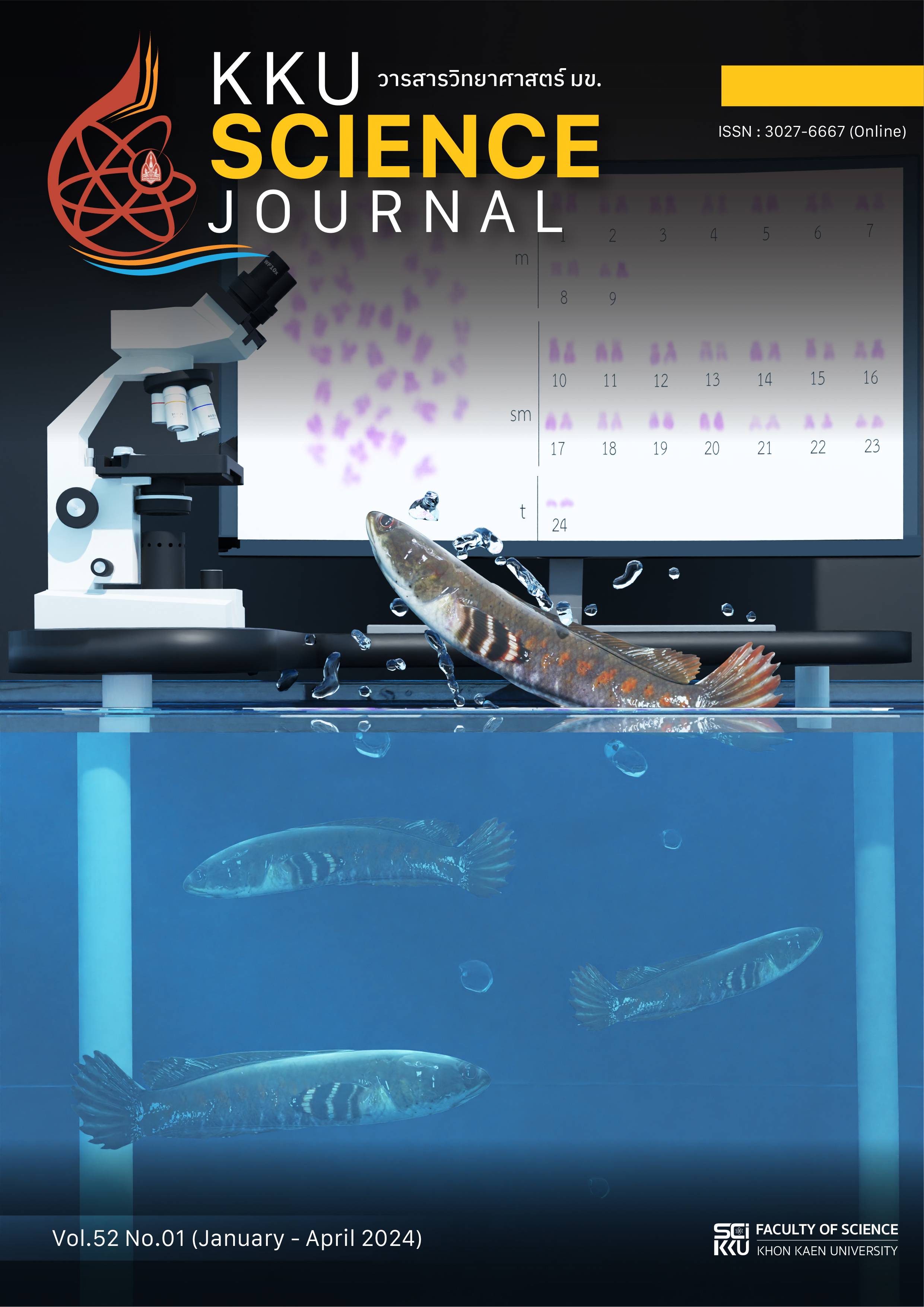On the Diophantine Equation a^x+(a+2)^y=z^2
Main Article Content
Abstract
In this paper, we investigated the solutions of the Diophantine equation , where
is a positive integer and
are non-negative integers. Let
be the set of non-negative integer solutions
of the equation. The results showed that 1) if
is a prime number with
, then
, where
is an integer, otherwise
. 2) If
is a prime number and
is even and the equation has a solution, then
and
. 3) Let
be a prime number such that
and
. Then
, where
is an integer, otherwise
, when it satisfies one of the following cases: case 1
or case 2 there exists a prime number
such that
and
.
Article Details

This work is licensed under a Creative Commons Attribution-NonCommercial-NoDerivatives 4.0 International License.
References
Dokchann, R. and Pakapongpun, A. (2020). On the Diophantine equation a^x + (a+2)^y = z^2, where a≡5(mod 42). Tatra Mountains Mathematical Publications 77: 39 – 42. doi: 10.2478/tmmp-2020-0030.
Gupta, S., Kumar, R. and Kumar, S. (2020). On the non-linear Diophantine equation p^x + (p+2)^y = z^2. Ilkogretim Online – Elementary Education Online 19(1): 472 – 475. doi: 10.17051/ilkonline.2020.661876.
Karaivanov, B. and Vassilev, T.S. (2016). On certain sums involving the Legendre symbol. Integers. 16:1 - 10.
Mihăilescu, P. (2004). Primary cyclotomic units and a proof of Catalan’s conjecture. Journal für die Reine und Angewandte Mathematik 572: 167 - 195.
Pakapongpun, A. and Chattae, B. (2022). On the Diophantine equation a^x + (a+2)^y = z^2, where a≡3(mod 20). International Journal of Mathematics and Computer Science 17(2): 711 - 716.
Pandichelvi, V. and Vanaja, R. (2022). Inspecting integer solutions for an exponential Diophantine equation p^x + (p+2)^y = z^2. Advances and Applications in Mathematical Sciences 21(8): 4693 - 4701.
Rabago, J.F.T. (2013). A note on two Diophantine equations 17^x + 19^y = z^2 and 71^x + 73 ^y = z^2. Mathematical Journal of Interdisciplinary Sciences 2(1): 19 – 24. doi: 10.15415/mjis.2013.21002.
Sroysang, B. (2012). On the Diophantine equation 3^x + 5^y = z^2. International Journal of Pure and Applied Mathematics 81(4): 605 - 608.
Sroysang, B. (2013a). On the Diophantine equation 5^x + 7^y = z^2. International Journal of Pure and Applied Mathematics 89(1): 115 - 118. doi: 10.12732/ijpam.v89i1.14.
Sroysang, B. (2013b). On the Diophantine equation 47^x + 49 ^y = z^2. International Journal of Pure and Applied Mathematics 89(2): 279 – 282. doi: 10.12732/ijpam.v89i2.11.
Sroysang, B. (2013c). On the Diophantine equation 89^x + 91^y = z^2. International Journal of Pure and Applied Mathematics 89(2): 283 - 286. doi: 10.12732/ijpam.v89i2.12.
Sroysang, B. (2014). On the Diophantine equation 143^x + 145^y = z^2. International Journal of Pure and Applied Mathematics 91(2): 265 - 268. doi: 10.12732/ijpam.v91i2.13.
Sugandha, A., Tripena, A., Prabowo, A. and Sukono, F. (2018). Nonlinear Diophantine equation 11^x + 13^y = z^2. IOP Conf. Series: Materials Science and Engineering 332: 1 - 4. doi: 10.1088/1757-899X/332/1/012004.
Viriyapong, C. and Viriyapong, N. (2023). On the Diophantine equation a^x + (a+2)^y = z^2, where a≡5(mod 21). International Journal of Mathematics and Computer Science 18(3): 525 - 527.
Viriyapong, C. and Viriyapong, N. (2024). On the Diophantine equation a^x + (a+2)^y = z^2, where a is congruent to 19 modulo 28. International Journal of Mathematics and Computer Science 19(2): 449 - 451.


